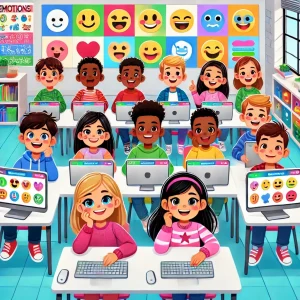Role of Online Therapy in Supporting Kids with Learning Disabilities
Last Updated: August 24, 2024
In today’s fast-paced digital world, the way we access therapy and counseling has evolved significantly. Online therapy, also known as virtual or digital therapy, has become a powerful tool for delivering mental health support. This approach is particularly beneficial for children with learning disabilities, who often face unique challenges that can impact their academic performance, emotional well-being, and social interactions.
Children with learning disabilities, such as dyslexia, dyscalculia, and dysgraphia, often struggle with more than just academics. They may experience anxiety, low self-esteem, and even depression due to the constant hurdles they face. Traditional therapy has always played a crucial role in helping these children manage their difficulties, but online therapy has opened up new avenues of support, offering flexibility, accessibility, and tailored care that can be adapted to each child’s specific needs.
Read more: Exploring the Impact of Dyslexia on Speech and Communication
Understanding Learning Disabilities in Children
Learning disabilities are neurological disorders that affect the brain’s ability to receive, process, store, and respond to information. These disabilities can make tasks such as reading, writing, math, and even communication more challenging for children. While learning disabilities are common, affecting about 1 in 5 children, they are often misunderstood. Here’s a closer look at some of the most common types:
- Dyslexia: This affects reading and language processing, making it difficult for children to read, spell, and write.
- Dyscalculia: This impacts a child’s ability to understand numbers and mathematical concepts.
- Dysgraphia: This affects writing, leading to difficulties with handwriting, spelling, and organizing thoughts on paper.
- Auditory Processing Disorder (APD): This disorder makes it hard for children to understand and process sounds, even though their hearing is typically normal.
- Visual Processing Disorder: This impacts how a child interprets visual information, affecting reading, writing, and math.
- Nonverbal Learning Disorder (NLD): This is characterized by strong verbal skills but challenges with motor skills, visual-spatial tasks, and social skills.
Emotional and Social Impact of Learning Disabilities
Children with learning disabilities often face more than just academic challenges. The frustration of struggling with tasks that seem easy for others can lead to feelings of inadequacy and low self-esteem. Over time, these emotional struggles can evolve into anxiety, depression, and social withdrawal. In school, these children may find it hard to make friends, leading to a sense of isolation. The social challenges can be as overwhelming as the academic ones, making it crucial to address both in therapy.
Also Read: Learning Techniques for Students
The Need for Tailored Therapeutic Approaches
Every child with a learning disability is unique, which means there’s no one-size-fits-all solution. Tailored therapeutic approaches are essential for addressing the specific needs of each child. For instance, a child with dyslexia may benefit from reading interventions, while a child with dysgraphia might need occupational therapy. Online therapy offers the flexibility to customize sessions, focusing on the areas where the child needs the most support.
How Online Therapy Supports Children with Learning Disabilities
1. Flexible and Accessible Support
One of the biggest advantages of online therapy is its flexibility and accessibility. Unlike traditional in-person therapy, which can be limited by geographic location, online therapy provides consistent access to expert therapists regardless of where a child lives. Whether you’re in a bustling city or a quiet rural area, your child can connect with a specialist who understands their unique needs.
For busy families, online therapy offers the convenience of managing sessions without the hassle of travel. Appointments can be scheduled around school hours, extracurricular activities, and family commitments, making it easier to integrate therapy into daily life. This flexibility ensures that children receive the support they need without additional stress on the family.
2. Personalized Therapeutic Approaches
Children with learning disabilities require individualized care, and online therapy excels in providing this. Sessions can be customized to target the specific challenges a child faces, whether it’s reading difficulties, math anxiety, or social skills. Therapists use a variety of tools and techniques, such as interactive games, visual aids, and digital worksheets, to engage children and make learning both effective and enjoyable.
For instance, a child with dyslexia may benefit from visual learning tools that reinforce reading skills, while a child with auditory processing disorder might work on exercises that improve sound discrimination. This level of personalization is crucial in helping children make progress at their own pace and in ways that resonate with them.
3. Building Coping Skills and Self-Esteem
Learning disabilities can make everyday tasks feel overwhelming, leading to frustration and low self-esteem. Online therapy plays a critical role in helping children develop coping strategies that make these challenges more manageable. Therapists guide children in recognizing their strengths, setting achievable goals, and celebrating small victories, all of which contribute to building confidence.
Through consistent support and positive reinforcement, online therapists help children learn to replace negative self-talk with empowering thoughts. As children see their progress, their self-esteem grows, allowing them to approach academic and social situations with greater confidence.
4. Addressing Emotional and Behavioral Issues
Children with learning disabilities often face emotional and behavioral challenges, such as anxiety, depression, or attention difficulties. These issues can exacerbate their academic struggles, making it essential to address them alongside learning interventions. Online therapy offers a safe space for children to express their feelings and work through their emotions.
Therapists use evidence-based methods like cognitive behavioral therapy (CBT) to help children manage anxiety and develop healthier thinking patterns. Behavioral strategies are also employed to improve focus, reduce disruptive behaviors, and enhance time management skills. By addressing both the emotional and behavioral aspects of learning disabilities, online therapy provides a comprehensive approach that supports the child’s overall well-being.
Online Therapy vs. In-Person Therapy
| Aspect | Online Therapy | In-Person Therapy |
|---|---|---|
| Flexibility | Highly flexible; sessions can be scheduled at convenient times for both children and parents, allowing therapy to fit easily into busy schedules. This flexibility reduces the stress of commuting and allows for more consistent therapy sessions. | Limited by location and therapist availability; sessions often need to be scheduled during business hours, which can conflict with school or other activities. Travel time may also be a factor, potentially leading to missed sessions. |
| Accessibility | Accessible from anywhere with an internet connection, making it ideal for families in remote areas or those with limited access to specialized therapists. It also enables continuity of care even during vacations or relocations. | Dependent on physical location; families may need to travel long distances to access specialized care, especially if they live in rural or underserved areas. This can be a significant barrier to consistent therapy. |
| Personalization | Easily customizable; therapists can use a wide range of digital tools and resources tailored to the child’s specific learning needs. Sessions can be adjusted in real-time based on the child’s engagement and progress. | Customizable, but limited by time and resources available during in-person sessions. While therapists can still tailor their approach, the range of tools and activities may be more constrained compared to online settings. |
| Parental Involvement | Active parental participation; parents can easily observe sessions, communicate directly with therapists, and learn techniques to support their child at home. Online platforms often facilitate seamless communication and collaboration between therapists and parents. | Occasional parental updates; parents may receive less frequent feedback, usually during scheduled meetings or after sessions. Involvement may be limited to specific times, reducing opportunities for active engagement in the therapy process. |
Benefits of Online Therapy for Kids with Learning Disabilities
Improving Social Skills
Children with learning disabilities often face challenges in social situations. Difficulty in reading social cues, initiating conversations, or participating in group activities can lead to feelings of isolation. Online therapy can play a crucial role in helping children enhance their social interactions. Therapists use interactive activities and role-playing exercises to teach children how to engage with others in a positive way. For example, a therapist might guide a child through a virtual conversation, helping them practice skills like taking turns, making eye contact, and expressing themselves clearly.
In a virtual setting, therapists can also use digital tools to create scenarios that mimic real-life situations, allowing children to learn and practice these skills in a safe and controlled environment. Over time, these strategies help children feel more comfortable in social settings, improving their ability to form friendships and interact with peers.
Enhancing Focus and Behavior
Children with learning disabilities often struggle with maintaining focus, managing time, and controlling their behavior. These challenges can make academic tasks and daily routines more difficult. Online therapy offers targeted interventions to help children improve these skills. Therapists use techniques such as breaking tasks into smaller, manageable steps and incorporating visual schedules to help children stay on track.
During online sessions, therapists keep children engaged by using interactive activities, frequent breaks, and personalized rewards. For instance, a therapist might use a timer to help a child focus on a task for a set period, gradually increasing the time as the child’s attention span improves. By providing consistent support and reinforcement, online therapy helps children develop better focus, time management, and self-regulation, leading to improved behavior both at home and in school.
Parental Involvement and Family Support
Parents play a vital role in their child’s therapeutic journey, and online therapy makes it easier for them to be involved. Unlike traditional therapy, where parents may only receive updates during occasional meetings, online therapy often encourages real-time participation. Parents can observe sessions, learn techniques from the therapist, and ask questions directly, ensuring they are fully equipped to support their child’s progress.
Online therapy also provides valuable guidance to families on how to create a supportive environment at home. Therapists offer strategies for reinforcing positive behaviors, managing stress, and setting realistic goals for the child. By working closely with parents, online therapy not only benefits the child but also strengthens the overall family dynamic.
Know more: Tips to Develop Good Learning Habits
Challenges and Considerations
Technological Barriers
While online therapy offers many benefits, it’s not without its challenges, particularly when it comes to technology. For some families, access to a reliable internet connection or suitable devices can be a significant barrier. Slow internet speeds, dropped connections, or outdated equipment can disrupt sessions, making it difficult for children to stay engaged and for therapists to deliver effective care.
To overcome these challenges, families can explore a few practical solutions. First, ensuring that the internet connection is stable and strong is crucial. This might involve upgrading to a higher-speed plan or investing in a quality router. Additionally, using a wired connection instead of Wi-Fi can reduce the risk of interruptions. If access to devices is an issue, some communities and schools offer programs to loan or subsidize tablets or laptops for educational purposes. Families might also consider scheduling sessions during times when the household’s internet usage is lower, reducing the likelihood of connection issues.
Maintaining Engagement
Keeping children engaged during online therapy sessions can be challenging, especially for those with learning disabilities who may already struggle with focus and attention. Parents often worry that their child might not stay interested or that virtual sessions won’t be as effective as in-person therapy. However, experienced online therapists use a variety of strategies to maintain engagement and make sessions as interactive as possible.
For example, therapists often incorporate visual aids, interactive games, and multimedia resources that are both educational and entertaining. They might also break sessions into shorter segments with brief breaks, allowing children to recharge and stay focused. Personalizing the content to align with the child’s interests is another effective technique—whether it’s using a favorite character in a role-playing exercise or incorporating a child’s hobby into the therapeutic activities.
Conclusion
Online therapy offers vital support for children with learning disabilities, providing flexible and accessible care that meets their unique needs. It helps improve social skills, enhances focus, and addresses emotional and behavioral challenges. By choosing the right therapy and therapist, parents can ensure their child receives personalized care that helps them grow academically and personally.
For parents looking for expert guidance, Wellness Hub connects them with experienced online therapists who understand the challenges children with learning disabilities face. With customized therapy plans, Wellness Hub helps children build the skills and confidence they need to succeed. Online therapy is more than just a convenient option; it’s a powerful way to help children with learning disabilities reach their full potential.
Frequently Asked Questions:
1. How does online therapy support children with learning disabilities?
Online therapy provides personalized and flexible support that helps children with learning disabilities improve their social skills, focus, and behavior. Therapists use tailored strategies to address each child’s unique challenges, making therapy more effective and accessible.
2. What types of learning disabilities can online therapy help with?
Online therapy can help children with various learning disabilities, including dyslexia, dyscalculia, dysgraphia, auditory processing disorder (APD), visual processing disorder, and nonverbal learning disorder (NLD). Therapists customize sessions to address the specific needs of each child.
3. Are there any technological challenges with online therapy for kids?
Yes, some families may face challenges related to internet access or device availability. However, solutions like improving internet connections, using wired setups, and scheduling sessions during low-usage times can help overcome these barriers.
4. How can online therapy improve a child’s social skills?
Online therapy uses interactive tools and role-playing exercises to help children with learning disabilities practice and improve their social interactions. Therapists guide children in developing communication skills, such as taking turns and reading social cues, in a virtual setting.
5. What role do parents play in online therapy for learning disabilities?
Parents are crucial partners in the online therapy process. They can observe sessions, learn techniques to support their child at home, and work closely with therapists to reinforce positive behaviors and strategies.
6. Is online therapy as effective as in-person therapy for children with learning disabilities?
Online therapy can be just as effective as in-person therapy when it is tailored to the child’s needs. Experienced therapists use engaging and interactive methods to ensure that children remain focused and make progress during virtual sessions.
7. How do therapists keep children engaged during online therapy sessions?
Therapists use a variety of techniques to maintain engagement, including interactive games, visual aids, and personalized activities. Sessions are often broken into shorter segments with breaks to help children stay focused.
8. What are the benefits of choosing Wellness Hub for online therapy?
Wellness Hub offers access to experienced therapists who specialize in working with children with learning disabilities. They provide customized therapy plans that focus on the specific needs of each child, ensuring comprehensive support and positive outcomes.
9. How can online therapy help manage anxiety and depression in children with learning disabilities?
Online therapy helps children with learning disabilities manage anxiety and depression by using techniques like cognitive behavioral therapy (CBT). Therapists work with children to develop healthier thinking patterns, reduce stress, and build emotional resilience, all within a supportive virtual environment.
10. What should parents look for when choosing an online therapist for their child with learning disabilities?
When choosing an online therapist, parents should look for someone with experience in treating learning disabilities, a solid track record, and a personalized approach to therapy. It’s also important to find a therapist who communicates well with both the child and the parents, ensuring a collaborative and effective treatment plan.
About Author:
Lasya Vooturi,
Clinical Psychologist (A) & Behavioral Therapist
Lasya holds a Professional Diploma in Clinical Psychology from Amity University, where she deepened her understanding of psychological principles from March 2023 to March 2024. With over a year of dedicated experience as a Behavioral Therapist, Lasya has honed her skills in applying effective therapy techniques tailored to individual needs. Fluent in Telugu, Hindi, and English, she is adept at connecting with a diverse range of clients, ensuring comprehensive communication and understanding. Lasya’s approach is grounded in empathy and scientific rigor, making her a trusted ally in navigating mental health challenges.
Book your Free Consultation Today
Parent/Caregiver Info:
Client’s Details:
* Error Message








